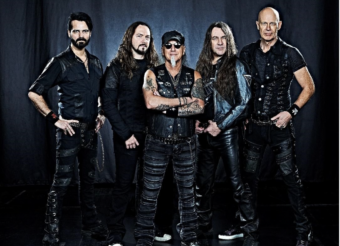When Cincinnati’s Afghan Whigs got signed to Elektra after 1992’s Congregation, fans were only just starting to notice what set them apart from the flannel-clad angst brigade: a healthy appreciation of R&B and an unhealthy fixation on sexual discontent that bordered on violent, at least in frontman Greg Dulli’s lyrics. The band’s 1993 major-label debut, Gentlemen, was the only Whigs album Dulli wrote on tour and it remains a harrowing song cycle about the end of a toxic relationship, and is still rightfully considered their best album. Earlier this month, the 11-track set received a deluxe reissue from Rhino, Gentlemen at 21, filled out with a second disc featuring demos of every song, as well as all B-sides, covers, and EP tracks from the period.
“I was kind of depressed,” Dulli says over the phone, trying to recall the beginnings of the record. “And I think playing guitar after hours was my way of comforting myself. It was totally helping me figure out larger issues that were going on.”
Despite the unsettling content and Dulli’s inner demons, the band managed to negotiate a deal so lucrative that their Elektra contract had a clause to option for a Dulli-penned feature film, one of the demands he hatched after snagging a copy of Prince’s Warner Bros. contract. That they actually got it is a testament to the cinematic allure of the tunes that would eventually make up Gentlemen.
“The script was based on a book,” Dulli confirms. “Spoken in Darkness by Ann Imbrie. I was developing that film with Ted Demme and Joel Stillerman, who were partners in this company called Spanky Pictures. But Ted passed away in 2002. As the years go by, I’ve read that I wrote a script for a Black Love [the Afghan Whigs’ 1996 album] film and that’s not true. But I definitely asked for a film budget.”
In honor of Gentlemen‘s recent 21st birthday, SPIN spoke with Dulli about the stories behind each of the album’s 11 tracks. Find his track-by-track commentary below.
//www.youtube.com/embed/Ca5xrFsoTH4
“If I Were Going”
Where did the idea come from to spin “Debonair” off into that intro?
Probably from Roger Waters. “Debonair” was written before “If I Were Going.” That lyric [“Cause it don’t bleed / And it don’t breathe / It’s locked its jaws / And now it’s swallowing…”], I wanted to use it in a more meditative way. Almost as an overture. I wanted the introduction for what was to come to be intimate before it got all stormy. Telling you this story in a quiet bar.
//www.youtube.com/embed/l6ER2_4q5KQ
“Gentlemen”
I wrote “Gentlemen” in Tampa, Florida, after a soundcheck, and the band went to eat and I stayed at the club and played guitar by myself, which I did often. That’s where I got the riff. Later on, I was walking through the town, Ybor City, I had the riff in my mind and I started to formulate the lyrics as I was walking around. That song was written pretty quickly.
//www.youtube.com/embed/st_69q853Z8
“Be Sweet”
Rick McCollum wrote the riff to “Be Sweet,” and we were playing it in a soundcheck in Paris. A lot of the time, I would freestyle vocals and I remember I was day drunk and spit out that whole first verse in the soundcheck and immediately took off my guitar and wrote it down on the back of a notebook. I had no second guessing of what that said. I really enjoyed what that said.
Did the major label give you any trouble with the opening lyric [“Ladies, let me tell you about myself / I got a dick for a brain”]?
No. Look at “Cop Killer” and “Straight Outta Compton,” compared to those lyrics, these lyrics were summarily mild.
//www.youtube.com/embed/oJwWmz8Mp3U
“Debonair”
I really liked the riff to the Jackson 5’s “I Want You Back,” and I had become a big fan of Twin Peaks. And “Debonair” was my attempt to marry the riff from “I Want You Back” to the chord progression of the Twin Peaks intro. [Laughs.]
//www.youtube.com/embed/Wg7sWNKxu9I
“When We Two Parted”
Since the band reunited, you’ve been mashing up “When We Two Parted” with Drake’s “Over My Dead Body” in concert. Do you feel a kinship with him in these songs?
I really loved that record, the Take Care record. The part that I sing is the hook in “Over My Dead Body” which is written by this Canadian lady Chantal Kreviazuk. I guess she is a friend of Drake’s. I just thought that was a beautiful lyric, and the melody really hit me hard, and it fit perfectly. Before we broke up the first time, I used to mash “When We Two Parted” into “Ex-Factor” by Lauryn Hill.
You guys have managed to get onstage with Usher, have you had any feedback from other R&B singers, like Drake and Lauryn Hill, about all the covers that you’ve done?
No, but I did meet Frank Ocean and he did enjoy our cover of “LoveCrimes.” Went to his show while we were on tour, when he was also doing his channel ORANGE tour, and Joe Shanahan, the owner of Metro in Chicago, introduced us. Really nice guy. I’m a huge fan, I think Frank Ocean is an incredibly special talent. I like both his records, but nostalgia, ULTRA. was the first thing I heard. “Strawberry Swing” was the first song I heard, and that song blew my mind. I went out and found that record, I heard “Strawberry Swing” at a party and was like, “Wow, what the fuck was that?” But there are some beautiful songs on channel ORANGE.
//www.youtube.com/embed/gQv9dKOBK5Q
“Fountain and Fairfax”
“Fountain and Fairfax” is an actual intersection in West Hollywood. There’s a place called Crescent Heights, a Methodist church where they do AA/MA meetings, and a friend of mine wanted to go to a meeting. He was having some difficulties in his life and asked me to go with him, and I did. I heard some really poignant testimony there, and also saw a couple people up there who looked like they were auditioning for an acting job. And I was repulsed by that, to the point I was moved to write a song about it.
//www.youtube.com/embed/FmOw-M3E5so
“What Jail Is Like”
I would guess the first song that I wrote for Gentlemen was “What Jail Is Like.” I don’t remember the circumstances, but I remember I had become frustrated trying to make a phone call to the United States and not getting through and I was highly agitated. When you’re sad or angry or things aren’t going well in your life, and in your mind you’re looking for blame placement and shooting all the rounds at everybody else — that’s a slippery moment. That song is blaming other people for my problems, and I had yet to examine my own culpability, and full-stop examined it on that one.
//www.youtube.com/embed/TtsgE8Rdd3Q
“My Curse”
You’re often quoted as saying that “My Curse” was too personal for you to sing. Was that the truth or was that just what you were saying at the time?
That was true, I felt at that point I had gotten too close to the record in my mind [which was largely written about Dulli’s then-relationship ending], and felt that the woman in question deserved a voice in the proceeding. And when I looked at the lyrics — this goes back to the culpability — I fully accepted the culpability and handed it down to the young lady.
Marcy [Mays of Scrawl] had been a confidante of mine, we had toured together, and I was a huge fan of her voice. She was the only person I considered and I’m grateful she accepted my invitation. I remember when we started doing the song, I sat in the studio trying to direct her and she tried it a couple of times that way, then told me to get the fuck out of the studio and have lunch and let her do her thing. In almost every way, that song put me in my place and the performance of “My Curse” is all Marcy Mays.
//www.youtube.com/embed/knJyYzHKVKk
“Now You Know”
“Now You Know” was written in Memphis, and I needed another song. Because I had the benefit of everything that came before it, I was able to custom-write that song. I needed to burn the town down. It’s the most violent song, the nastiest song on the record and in that way the perfect setup to the cover and the instrumental that came after.
//www.youtube.com/embed/s-mYhIQc6PA
“I Keep Coming Back”
What made you decide to cover Tyrone Davis’ “I Keep Coming Back?”
It was a song that I listened to almost ritually, every night before I went to bed. I would listen to it over and over, it was very comforting to me. I felt like it was the counterpoint to the violence that came before it. It was sweet, it was honest, it was vulnerable. It put everything that came before it into a focus of finality.
//www.youtube.com/embed/ypGdiETGFCA
“Brother Woodrow/Closing Prayer”
Did you write the instrumental specifically to close the album or did it just come from a jam?
I wanted to have a film score ending, I wanted something that would run while the credits ran. A piece of music that would play as the credits ran in the movie of my mind. I thought of it as a piece of film score.





